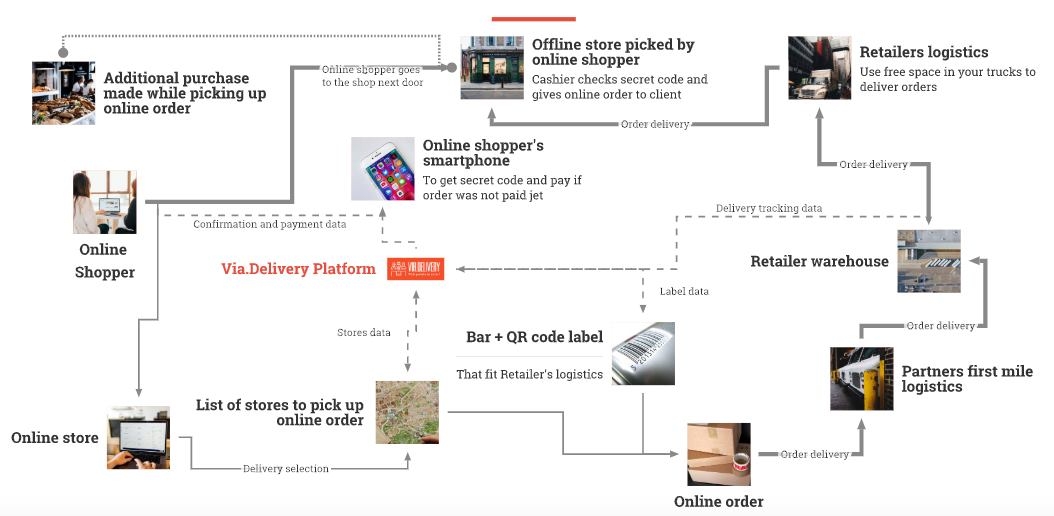28 May 2020
Dmitry Nikitin is an alumnus of the Master's program of 2011 and EMBA of 2016. In 2012, he founded the logistics company A-Motion Logistics Solutions. In 2015, he created a project for the delivery of ready-made sets of products with recipes “Korzina na dom”. In 2019, thanks to a partnership with Vkusvill to deliver such grocery sets to chain stores, he developed the Via.Delivery B2B platform idea.

Via.Delivery is a service that will allow savings on shipping. It connects online store IT systems with retailer logistics systems. Among the partners of the project are the stores of the X5 holding, the Aloe pharmacy chain, Vkusvill, and the Opti 24 gas station, in total, more than 10,000 points of delivery.
We talked with Dmitry and found out how the idea of creating Via.Delivery came about, how things are going during the pandemic, and why he felt the need for an MBA after the Master program.
You have great and successful experience in the logistics field. How did you come up with the idea of creating the Via.Delivery startup? What was your main reason for working on this project?
The story has begun much earlier. From 2009 to 2015, I had a logistics company, and from 2015-2019, we were engaged in the “Korzina na dom” project. At that time we began to analyze hypotheses related to delivery. As a result of the analysis, we realized that customers lacked points of delivery for their orders. Since it is important to maintain the correct temperature for the “Korzina na dom” project, the usual delivery companies did not suit our needs. We suggested that the stores of the Vkusvill company could become points of delivery for us. Customers would visit the store for shopping and at the checkout counter, they would give their order number and received their goods. The store kept track of how much income could be generated by such a stream of customers, i.e., whether these people created additional income for them. The experiment showed that additional purchases in the store averaged 360 rubles, which was a good indicator.
Transport companies that deliver online orders organizationally represent a set of fleets of vehicles and logistics systems. Network retail has the same infrastructure. For many of them, organizing a goods delivery system is just a question of filling in the empty spaces in the logistics chain with cars and relevant warehouse facilities. Therefore, shipping costs may be lower than that of regular logistics companies. In addition, when picking up an order in the store, the customer will often make additional purchases. We created the first version of the platform, which connects online stores and retail chains, and started selling it. Later we became finalists in the X5 Retail group competition, and in the fall of 2019 we signed a contract with X5 for cooperation and delivery.
We then realized that our platform was working. We hired a team of IT specialists and further developed the program for broader and more stable delivery.
Did you have a sense during the process of working on the Via.Delivery project that it would become popular and in demand?
Before starting, we did a lot of tests, and analyzed hypotheses. We used the Lean Startup model. The concept of this model is that we took a small step with minimal effort to understand whether there was a need for our project or not. If the services that we could provide were in demand, we took the next step. If not, then we took a step to the side and looked at possible adjustments… and so on until we found a system that satisfied both us and our customers.
There is great competition in the logistics industry, what makes Via.Delivery different from other companies?
We differ from competitors in that we have lower costs. Some time ago I left transport logistics because I realized that you can only compete at a price. Сustomers took all the additional services for granted. There was a price war among companies, when the cost of services fell below net cost. At that time, I did not see the technology that could revolutionize the industry, and sold my company.
When we created Via.Delivery, we understood that with a certain scheme of work, the cost of services would be much lower, because we could use the existing logistics systems for retail. And in the market, where the main indicator is price, we would gain significant advantages — because of the low price of the service due to the low cost involved.
In a comment to one of the media, you said: “Self-isolation will form a habit in people to buy online ...”. How much has the popularity of your service grown now? And has the crisis caused by the pandemic become a springboard for the development of the logistics industry?
Speaking of e-commerce logistics, yes, the corona crisis has become a growth point. But in classical logistics, no, the processes, on the contrary, have slowed down.
It is difficult for me to assess the growth rate before and during the crisis, because until April we were still in the MVP stage. At that moment, we grew, but did not fully see the development potential of the market. From April, since the launch, we have monthly been able to observe market growth, but I can’t say for sure that this is due to the crisis. I can say that, of course, we are in a favorable situation, because under the conditions of any epidemic, food, medicine and fuel will remain in demanded, and therefore, food shops, pharmacy chains, gas stations and their logistics will continue to function and grow.
Our supply chain is perfectly stable in this situation. There are many orders from online stores. The crisis has created an undeniably good springboard for online sales and e-commerce in general. I think that many will try to order goods online, they will understand how convenient it is, and they will continue to do so after the crisis.

Your startup received the Karpov Venture Award, and has won a prize in the Unicorn Battle in Moscow, and will also participate in the finals in San Francisco. Do bonuses and public recognition help business to grow?
Sometimes prize money is attached to the victories in a competition, sometimes status, but for us this is not always important. For many investors, participation in competitions plays a role in choosing a startup for investment. Last week we signed a contract with one of the best Silicon Valley accelerators. Most likely, our victories in competitions played a role in this.
You took part in other accelerators, both in Moscow and St. Petersburg. What do they give to a start-up business?
Participation in accelerators provides not only a community, but also a great source of additional education. We have gained a lot of knowledge related to hypothesis testing. It is one thing to manage and develop an existing business, and it is quite another to create a project from scratch and make it work. These are completely different methods that can be learned accelerators.
We begin our cooperation with the accelerator in Silicon Valley in August this year. Before that, we did not work with America. At this stage, I have noted that participation in this accelerator gives access to incredible databases. In two clicks you can get acquainted with the top management of companies from the fortune global 500. The system allows you to track how often certain companies invest in startups, etc.
Returning to the origins of your professional development. You graduated from the Master program at GSOM in 2011. What did you do after graduating, and then how did your GSOM education help you?

The GSOM Master program gave me an excellent international experience. We talked to a large number of foreign students. Then I got an understanding of the basics of business, interaction with partners and colleagues, as well as the basics of marketing and finance. I have gained many contacts, with whom I still communicate to this day. Even while studying at GSOM, I bought two companies with credit money. One of them was goods for yoga, it did not work well. And the second, which was the transport company developed well, and later I bought the second part of company.
Five years later, you continued your studies at the Executive MBA program at GSOM. Why did you decide to continue your education? Why again at GSOM?
After I headed the transport company, I had the feeling that I lacked knowledge. I understood how to do somethings and how not to do somethings, but there was no complete picture in terms of managerial competencies and consequences. Therefore, I decided to go to GSOM for the Executive MBA program.
What advantages did you receive after the completion of the Executive MBA program?
First of all, it is a question of the networking and the connections that I was able to create. I still to communicate and work with some of my MBA contacts. For example, Eugene Kolesnikov was my fellow student, and now we are working on the Via.Delivery project together. The Executive MBA program is not only an excellent educational knowledge base at a high level, but also very importantly a question of the circle of people with whom you study. It is precisely for this, in particular, that many choose to do the MBA.
При использовании данного сайта Вы подтверждаете свое согласие на использование ВШМ СПбГУ cookie файлов. С подробной информацией Вы можете ознакомиться, перейдя по ссылке.